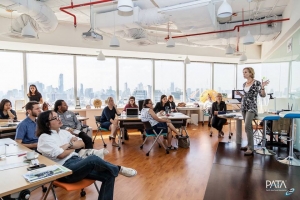Sustainable tourism was the focus at the recent PATA Academy, held in Bangkok from December 1-3, 2015. Organized by the Pacific Asia Tourism Authority (PATA), the Academy was attended by PATA members from nine countries in the region, and had the goal of giving participants a better understanding of the importance of the environment in which their organizations operate.
A team from IUCN and its Mangroves for the Future (MFF) initiative were included among the experts providing content at the Academy, offering a shortened version of Module 1 of the Business Ecosystems Training – a product of the World Business Council on Sustainable Development (WBCSD). The hands-on training gives participants an understanding of the basics of biodiversity and ecosystem services, and helps them to identify ways in which their industry or organization impacts on the health of ecosystems, and in turn how they are dependent on them for their success. As part of the training participants also reviewed a case study of the tourism industry on the island of Koh Tao in Thailand, which brought out issues related to the degradation of coastal and island ecosystems, and the risks and opportunities faced by the tourism industry as a result.
As part of the seminar IUCN also hosted a site visit to Bang Kachao, a 2,000-hectare riverine peninsula with wetlands and forests areas located just across the Chao Phraya River outside of Bangkok. Due to its proximity to Bangkok, Bang Kachao faces a number of significant environmental challenges such as the degradation of natural resources, the reduction of green space, water pollution from households and industries, land-filling for flood prevention and riverbank encroachment.
The site visit provided participants with a glimpse of diverse ecosystems and ideas of how well-managed tourism and working with local communities can promote the protection of important habitats. In a discussion session with local community conservation groups and conservation group Society for the Conservation of Natural Treasures and Environment (SCONTE), participants learnt that local wisdom and knowledge can contribute greatly to the sustainable management of Bang Kachao - for instance through the restoration of mangrove and other ecosystems. They also discussed how sustainable tourism can play an important role in biodiversity conservation by providing income to the local community that preserves the area.
IUCN Thailand started working in Bang Kachao on biodiversity conservation in 2013. Together with Thailand’s Royal Forest Department, the Asia-Pacific Network for Sustainable Forest Management (APFNet) and various other stakeholders such as community groups and academic institutions, IUCN aims to strengthen the management of urban forestry and biodiversity by supporting efforts to conduct landscape and biodiversity surveys, to establish demonstration sites, and to promote ecotourism activities that benefit the local community.
In the same year, IUCN and MFF also launched a partnership with Marriott International to protect the environment and support local communities in Bang Kachao and coastal areas of Thailand through mangrove restoration, the use of sustainable seafood sources and local procurement practices. The partnership underscores IUCN’s and MFF’s commitment to working with the private sector to effect change. Coastal tourism is one of the key focus areas for MFF’s private sector engagement strategy across the 11 countries in which it operates. As part of this focus a Memorandum of Understanding was signed with PATA in June 2015 which focuses on knowledge exchange and networking, with the goal of educating PATA members and actively engaging them in coastal conservation.
